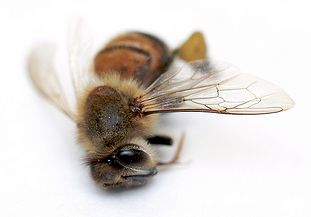We've been concerned for a while about colony collapse disorder, which has been decimating honeybee populations. The disorder is of uncertain origin, though there's some evidence linking it to pesticides; there's also evidence for viruses, fungi, and mites, or maybe it's all of them. And now scientists are investigating the possibility that it's caused by parasitic flies turning bees into zombies.
The fly in question, Apocephalus borealis, was known to parasitize wasps but not honeybees. Now, though, it appears that the parasite affects honeybees, with basically the same mechanism: It climbs into their stomachs and controls their brains.
The parasitic fly lays eggs in a bee’s abdomen. Several days later, the parasitized bee bumbles out of the hives—often at night—on a solo mission to nowhere. These bees often fly toward light and wind up unable to control their own bodies. After a bee dies, as many as 13 fly larvae crawl out from the bee’s neck. The bees’ behavior seems similar to that of ants that are parasitized—and then decapitated from within—by other fly larvae from the Apocephalus genus.
Apparently A. borealis has been killing bees in at least three different areas, unbeknownst to researchers. The parasite isn't likely to be solely responsible for declining bee populations, but it's clearly a threat. And it might be joining forces with other factors, weakening bees' resistance to fungi or pesticides:
Bees from affected hives—and the parasitizing flies and their larvae—curiously also contained genetic traces of Nosema ceranae, another parasite, as well as a virus that leads to deformed wings—which had already been implicated in colony collapse disorder. This double infection suggests that the flies might even be spreading these additional hive-weakening factors.
Zombie bees. Yikes. If you need me, I'll be at the Winchester.




